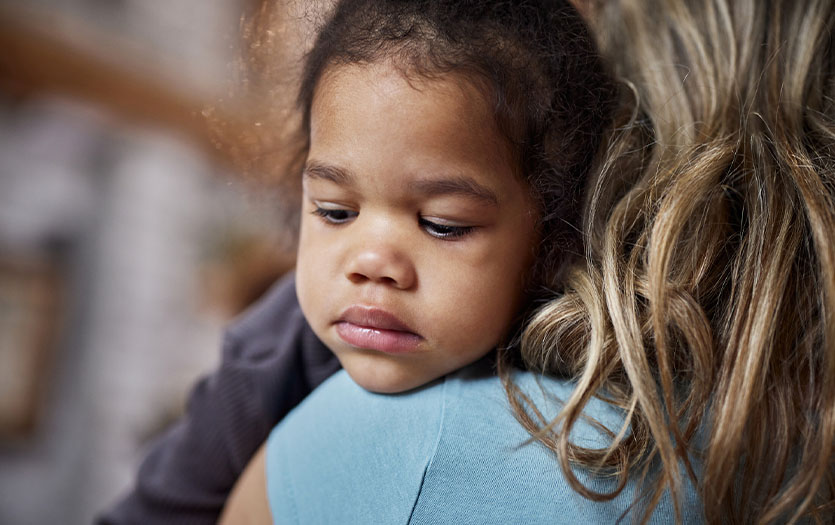Death is a mystery to many, but it can be particularly difficult to grasp for a child. They feel confused and possibly fearful at the thought of such a permanent life event. We asked Lydia Miller, manager, Chaplaincy, Parkview Health, to offer advice for parents and caregivers based on her observations from years of coming alongside families in their time of grieving.
What are some talking points for explaining loss to a child?
I love the idea of introducing the concept of the cycle of life fairly early in life. Talking about seasons, discussing death as a part of life with the loss of pets or other animals, or, even talking about seeds growing into plants and eventually dying, are all good conversation starters.
Many years ago, as a young parent, my husband and I chose to allow my 3 ½ year old to participate and experience the viewing and funeral of his great grandfather. This experience was helpful to my son in that his first experience with death was in the “natural order” of life. Great Grandpa had lived a long and fulfilling life and left a legacy of faith and love, which made things easier as my son dealt with his first loss.
Since then, I’ve encouraged parents to listen to their hearts and listen to their children. Never force a child to participate in a viewing or funeral service; however, be open to allowing your child to attend if they express the desire to do so. You know your child best and you know the nature of your loss. Listen to your heart.
When discussing a particular death with a child, it is best to be honest and age-appropriate, using terms that the child understands. Statements like “Great Grandpa’s body no longer works and he has died,” or “Grandma has died and can’t come back,” are appropriate.
Is there any language that should be avoided entirely?
Avoid using confusing language like “fallen asleep”, “passed away” or “flew up to Heaven to be an angel”. Children are very literal. It is best to keep things simple.
What are some signs they are not dealing with the loss well?
It is normal and expected to experience some changes in behavior while trying to cope, especially in the days and weeks following a loss. Many children are unable to express themselves verbally, and often act out their angry or fearful feelings in negative ways.
If there are prolonged signs of distress, including changes in appetite, sleep patterns, behavior, friends or grades, seek professional help. There are excellent professionals who can assess and treat your child’s emotional/psychological needs and help navigate the waters of grief. Research states that unresolved grief can lead to depression, suicidal thoughts and anxiety. It is always best to be proactive when dealing with a grieving child or teen.
How can a parent help their child cope?
As chaplains, this is one of the most frequent questions we get following a loss of a loved one. It is so difficult to grieve personally while attempting to help your child through sorrow. The first thing we advise parents to do is take care of themselves physically, emotionally and spiritually. We often use the airplane emergency analogy of putting on your own oxygen mask before assisting others. This is easier said than done, but essential in both the well-being of your child and yourself.
Secondly, offer space, but don’t force your child to talk about the loss. Just as adults grieve differently, some children may need to talk, while others just need to be near their parent.
Thirdly, children tend to feel safer and more comfortable with routines. As soon as it is possible, try to get your child back into a bedtime, school and activity routine. As a former school social worker, I often encountered parents who were fearful of sending their child back to school following a death because they did not want their child to be sad at school. Nevertheless, most children benefited from the sense of familiarity and “normalcy” school provided. When your child returns to school, please notify school personnel so that they can intervene as needed.
What if their child expresses a good deal of fear related to death?
Some fears are to be expected, especially during a traumatic/unexpected loss. Nightmares, obsessive questions about death, and fear of falling asleep, are all normal, especially from younger children or children who have never experienced a death. Calmly assuring the child, providing consistency in daily schedules/routines, allowing the child to voice their fears or express their fears through drawing or writing are all helpful. If these fears linger or interfere with daily living, please seek professional help.
Are there any special ceremonies or activities that can help children?
In our family, we have done special things, like making pillows out of Great Grandma’s old sweatshirts for the children or choosing a day to wear Grandpa’s favorite color and eat his favorite foods on his birthday. Other families have made their own traditions such as participating in charity walks or events, releasing balloons with messages to their loved one, or making memory boxes with photos and special reminders of a loved one. Just as every individual grieves differently, so do families. Find an activity or ceremony that resonates with your heart, faith, culture in which to honor and celebrated your loved one with your children. You will be glad you did.
Any books or additional resources a parent can use to help their child?
The best resource in our community is Erin’s House for Grieving Children. We are so blessed to have an organization that walks alongside grieving families with trained facilitators, age-appropriate activities, and helpful tools and resources.
The chaplain’s office has 4 books we distribute and recommend for grieving children: "The Memory Box: A Book About Grief" by Joanna Rowland, "Why Do Things Die?" by Katie Daynes and "The Grief Rock" by Lily Fossett.
Additionally, we often give children stuffed animals. Having a soft and cuddly tangible reminder of a loved one soothes and provides comfort. We often tell grieving children that our stuffed animals are special—and they are. They are used for hugging, wiping tear and listening to words of pain without judgment. More importantly, each stuffed animal received is covered in all of the love and prayers a chaplain can offer during the toughest moments of a child’s life.




